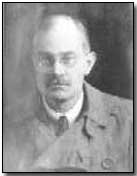Feature Articles - The Repression of War Experience by W. H. Rivers

The Attutude of Patients to War Memories
Everyone who has had to treat cases of war neurosis, and especially that form of neurosis dependent on anxiety, must have been faced by the problem of what advice to give concerning the attitude the patient should adopt towards his war experience.
It is natural to thrust aside painful memories just as it is natural to avoid dangerous or horrible scenes in actuality, and this natural tendency to banish the distressing or the horrible is especially pronounced in those whose powers of resistance have been lowered by the long-continued strains of trench-life, the shock of shell-explosion, or other catastrophe of war.
Even if patients were left to themselves most would naturally strive to forget distressing memories and thoughts. They are, however, very far from being left to themselves, the natural tendency to repress being in my experience almost universally fostered by their relatives and friends, as well as by their medical advisors.
Even when patients have themselves realised the impossibility of forgetting their war experiences and have recognized the hopeless and enervating character of the treatment by repression, they are often induced to attempt the task in obedience to medical orders.
The advice which has usually been given to my patients in other hospitals is that they should endeavour to banish all thoughts of war from their minds. In some cases all conversation between patients or with visitors about the war is strictly forbidden, and the patients are instructed to lead their thoughts to other topics, to beautiful scenery and other pleasant aspects of experience.
To a certain extent this policy is perfectly sound. Nothing annoys a nervous patient more than the continual inquiries of his relatives and friends about his experiences of the front, not only because it awakens painful memories, but also because of the obvious futility of most of the questions and the hopelessness of bringing the realities home to his hearers.
Moreover, the assemblage together in a hospital of a number of men with little in common except their war experiences naturally leads their conversation far too frequently to this topic, and even among those whose memories are not especially distressing it tends to enhance the state for which the term "fed up" seems to be the universal designation.
It is, however, one thing that those who are suffering from the shocks and strains of warfare should dwell continually on their war experience or be subjected to importunate inquiries; it is quite another to attempt to banish such experience from their minds altogether. The cases I am about to record illustrate the evil influence of this latter course of action and the good effects which follow its cessation.
Next - Records of Illustrative Cases
A "creeping barrage" is an artillery bombardment in which a 'curtain' of artillery fire moves toward the enemy ahead of the advancing troops and at the same speed as the troops.
- Did you know?
